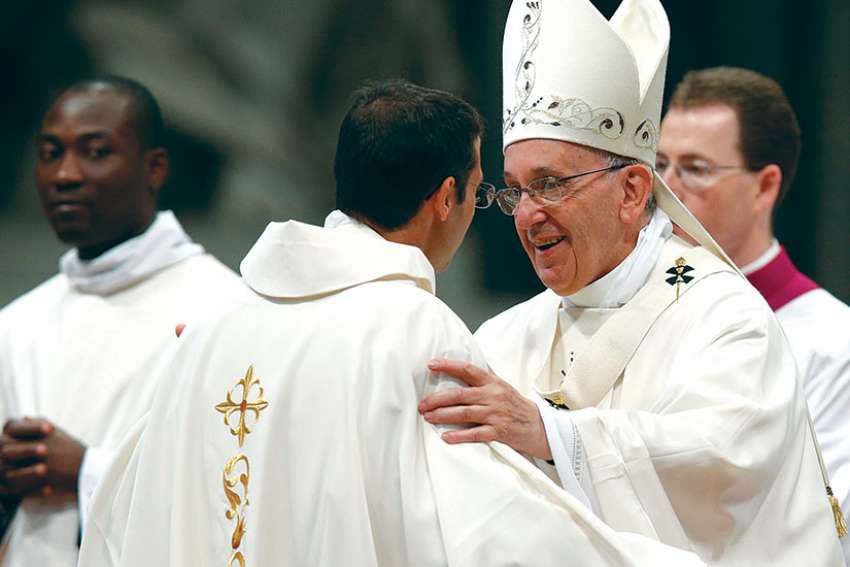Retired Bishop Gerald Wiesner, president of the Canadian Conference of Catholic Bishops from 1999 to 2001, said he was glad to hear the Pope may be willing to consider proposals from bishops’ conferences on ordaining married viri probati (literally, “tested men”) of proven character and leadership.
The on-again, off-again discussion about ordaining married men was given new life following release March 8 of an interview Francis gave to Germany’s Die Zeit magazine.
“We have to reflect about whether the viri probati are a possibility,” said the Pope, noting that declining numbers of vocations to religious life is an “enormous problem.”
“Then we also have to determine which tasks they could have, for example in far distant parishes.”
The Pope also stressed that men who are already priests would not be allowed to marry.
Ordaining married men has been proposed before by Canadian bishops, distressed that the Eucharist was often unavailable in remote indigenous communities where worship without Communion is led by respected elders who act as catechists in their communities.
Oblate bishops in northern Canada made a case for it in the early 1980s, during the pontificate of St. John Paul II, but the idea was rebuffed by the Congregation for the Doctrine of the Faith.
The discussion of married priests was brought up again at the 2005 Synod on the Eucharist, but was strongly opposed by cardinals holding posts inside the Vatican.
In recent years, the Canadian bishops have stopped advocating for viri probati, but Brazilian bishops trying to foster sacramental life in remote, indigenous communities in the Amazon have pressed Pope Francis on the issue.
Celibacy is not intrinsic to the priesthood, Wiesner points out. Of the 24 rites of the Catholic Church, only the Roman or Latin rite excludes married men from the priesthood. St. Peter and likely most of the other Apostles were married.
Married priests were the norm in the early Church, though celibate priests were favoured from the fifth century on. Even after the 11th century, when Church laws were passed against ordaining married men, examples of married Roman clergy continued to crop up.
The Die Zeit interview was not the first time Pope Francis has broached the topic. In 2014, he told Bishop Erwin Krautler of Xingu in Brazil’s vast Amazon rainforest that bishops need to come up with their own solutions, then bring proposals up through their national bishops’ conferences to Rome — including ordaining viri probati.
Also in 2014, Pope Francis issued a papal decree to allow married Eastern rite priests to serve in diaspora communities without obtaining special permission.
At the 2005 Synod on the Eucharist, Wiesner witnessed powerful cardinals shutting down discussion of viri probati. At the time, Wiesner told an Oblate newsletter close to half the synod fathers wanted to discuss the idea but were met with stern opposition.
Twelve years later, Wiesner isn’t expressing an opinion either for or against married priests in certain circumstances, but he’s overjoyed that Pope Francis appears open to the discussion.
“We have quite a number of people who are very rigid — who are very rigid in so many ways,” said the bishop. “The Holy Father, being so strong on compassion, having empathy and compassion for these people, he speaks to us as priests in reconciliation and so on to have compassion. I think there are people who are rather opposed to that. They are so rigid on absolutes and so on.”

